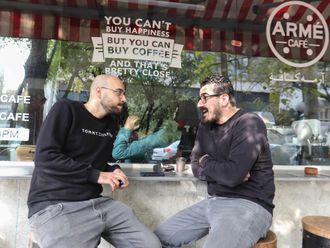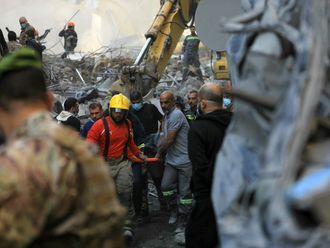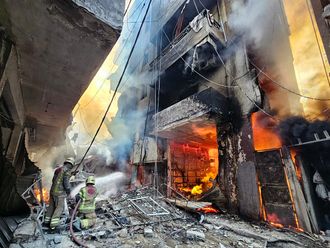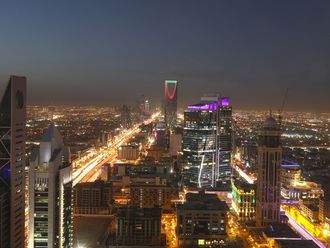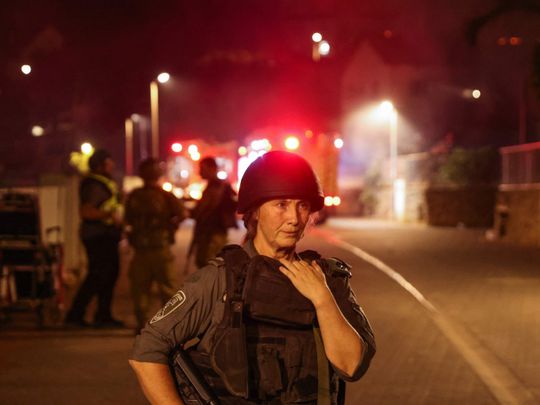
BEIRUT: The first signs that Gaza’s war could spill deeper into Lebanon arrived quietly in the capital, Beirut. A week after the Hamas militants staged their deadly blitz inside Israel, a banner cropped up in central Beirut: “Nothing thwarts oppression except for blood.”
The message was from an armed faction allied with Hezbollah, the Iranian-backed militia that also wields significant political power in Lebanon. Even before the banner went up, shelling was being exchanged daily between Israel and armed groups in Lebanon, including Hezbollah and a wing of Hamas.
So far, the cross-border fire is confined to the border region. Yet in Beirut and other parts of Lebanon, the physical distance from the conflict means little. In a country that can least afford more disruption, there are fears that events could drag Lebanon into a wider conflict.
Also read
Over the past four years, Lebanon has lurched from one crisis to the next. An economic free fall has eviscerated livelihoods and sent inflation to 350 per cent on food prices early this year. Sectarian and political feuds have left Lebanon virtually rudderless, with a lack of reliable state institutions and services. Hezbollah and its allies have control of parliament.
After a 2006 war between Israel and Hezbollah, the warnings from Israel have been stark: The next war could be even more devastating for Lebanon.
“All Western countries are talking to us, are sending their ambassadors, saying Hezbollah must not enter the war,” said a senior Lebanese official, who spoke on the condition of anonymity because of the sensitivity of the discussions.
Lebanon’s reply, he said, was that the United States must pressure Israel against a major ground invasion in Gaza - which could push Hezbollah to intensify its clashes with Israel. On Saturday, Israeli Defence Minister Yoav Gallant said that the military had “moved to a new phase in the war” after expanding its ground offensive.
“What we tell [Hezbollah], as the government, is that, ‘We can’t take a war.’ And the answer is, ‘We understand you. But we can also not take the fall of Hamas.’”
Life in Lebanon has slowly ground to a halt. Restaurants have emptied, as have hotels and bars. Clubs have canceled events in solidarity with Gazans. The same Lebanese who celebrated Hamas’s incursion have also criticized Hezbollah’s involvement, fearing that the destruction they see in images coming out of Gaza could be repeated in their own country. A petition against Lebanon’s involvement has been signed by nearly 8,000 people.
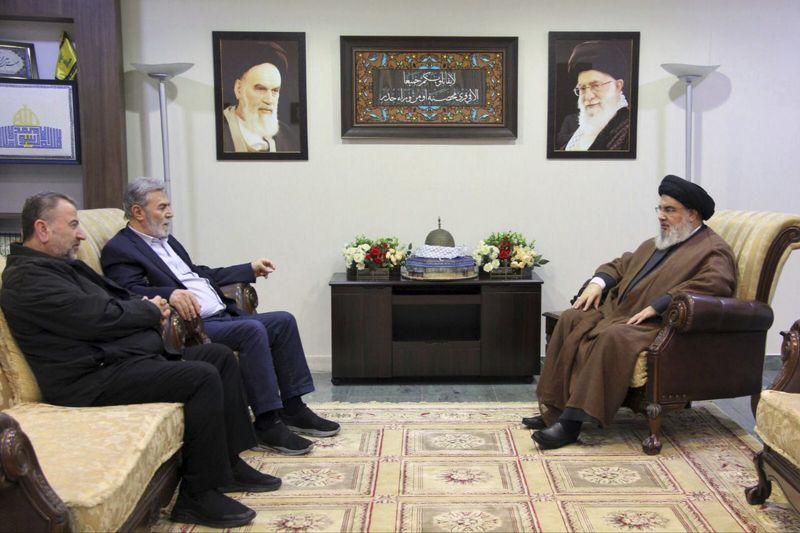
Hezbollah’s leader, Hassan Nasrallah, has been silent since the Hamas rampage in Israel on October 7. Behind the scenes, pressure from Lebanese officials in other political parties has mounted on the group to refrain from engaging in all-out combat with Israel.
In the 2006 war between Hezbollah and Israel, the public widely supported Hezbollah. “Now, it’s not the time,” the Lebanese official added. After the 34-day war in 2006, money from Gulf states flooded into Lebanon for reconstruction. Now, the official said, wealthy Arab states “have stopped giving money.”
Exodus after 2020 port blast
A deadly blast at Beirut’s port in 2020 — triggered by storage of highly volatile ammonium nitrate — killed more than 200 people. The pandemic, already underway by then, wreaked havoc on the country’s integral tourism and service industry. A mass exodus followed, with young graduates, medical professionals, fashion designers and others leaving for the security of countries in the Gulf, Europe and elsewhere.
Those who stayed have been waging a daily fight to make ends meet. A country previously synonymous with luxury and excess, Lebanon this year topped the list of countries with the highest inflation rate in nominal food prices, according to the World Bank.
Lebanese often depend on community-based networks in times of need. But even those options have vanished amid the economic chokehold.
Since 2006, Israel has repeatedly vowed that the response would be catastrophic if Hezbollah were to engage in another war. Israeli Prime Minister Benjamin Netanyahu’s national security adviser, Tzachi Hanegbi, repeated the warning on October 14, saying increased Hezbollah activities would lead to Lebanon’s “destruction.”
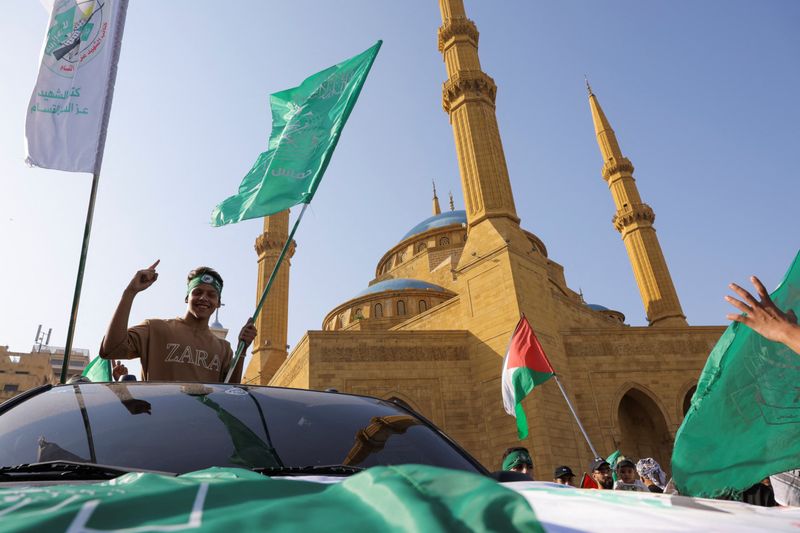
Mousa Abu Marzook, a member of Hamas’s political bureau, told Pan-Arab media channel Orient on October 16 that “unfortunately, there is no coordination” with Hezbollah. Marzouq called on Hezbollah to step up its attacks. “We were expecting the engagement with [October 7] to be much higher than what’s taking place now,” he said, “and we call on them for further participation.”
The more days pass without public comment from Hezbollah’s Nasrallah, the more notable his silence becomes, raising ire even among followers who support his calls for unwavering “resistance” to Israel. On October 21, the party’s deputy chief, Naim Qassem, said his party was aware of the appeals not to “participate in a wider way in the resistance operation.”
“They want the answer to be, ‘We have nothing to do with this,’” he said in a speech at a Hezbollah member’s funeral, referring to support for Gaza and Hamas. “But we always tell them we are involved, and we are part of this battle.”
‘Step-by-step escalation with Israel’s forces’
If events arise that require more involvement from the group, he said, “We will do so.”
Hezbollah has adopted “a step-by-step escalation with Israel’s forces,” said Mohanad Hage Ali, a Beirut-based fellow with the Carnegie Middle East Center. “Today, the rules of engagement are within a confined geographic region.” But he said he expects Hezbollah to expand its attacks if Israeli ground forces move into Gaza in large numbers.
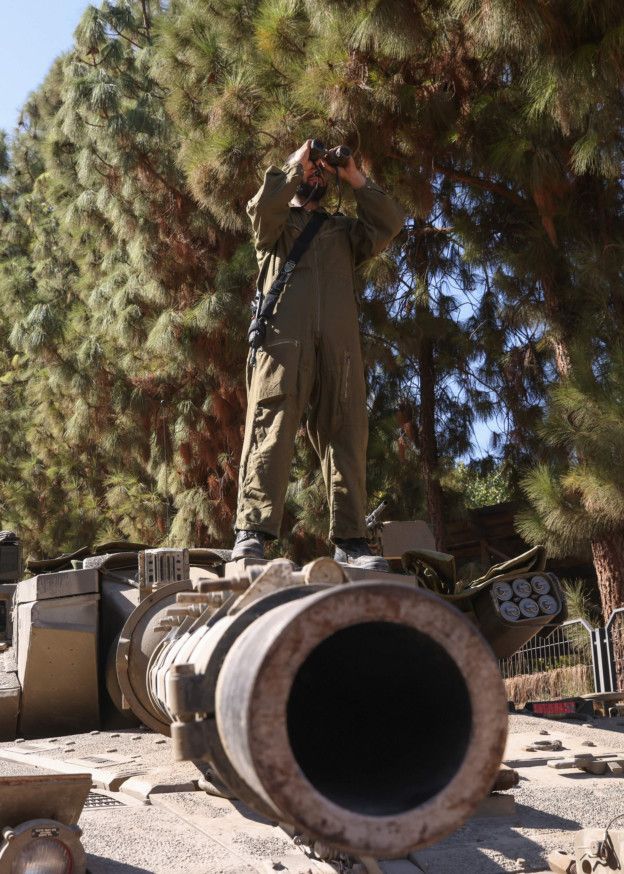
The group “has clearly considered this conflict an existential one,” he said. “Given this view, their only way forward is to gradually escalate to try to avoid a wider conflict.”
Over the past weeks, Hezbollah has disseminated videos purportedly showing its snipers hitting surveillance cameras and rockets blasting army positions inside Israel. At least 51 people have been killed by Israeli strikes in Lebanon, including 47 Hezbollah fighters, according to statements by the group. Israel’s military said at least five Israelis have been killed in the north, including three soldiers in a shootout with a Hezbollah gunman who infiltrated across the border.
A Western official told The Washington Post that contacts have been established with Lebanese officials and Hezbollah, asking them to “refrain from any kind of escalation from the border, and to generally keep Lebanon away from the conflict ongoing in Gaza.”
Lebanon can’t afford new conflict
Lebanon and its population “could not afford a new conflict amid the collapse of the state and the dire economic situation,” said the official, who spoke on the condition of anonymity because of the sensitive nature of the talks.
In 2006, Hezbollah militants conducted a raid into Israel and abducted two soldiers. Israel quickly struck the Beirut airport, laid siege to its seaports and declared the airspace closed.
More than 50,000 people fled Lebanon to Syria, where the government opened schools to receive the refugees and villagers opened their homes as temporary shelter. As the bombardment intensified in the south and Beirut, other people headed to northern parts of the country, heeding Israeli warnings to head northward.
Today, war-torn Syria could not afford to take in refugees. There are no guarantees either that safety could be found in Syria, a frequent site for Israeli strikes. Factions inside Syria have also, in the past weeks, lobbed rockets into Israel. In response, Israel hit the country’s two major airports, in Damascus and Aleppo, knocking each out of service twice.
In Lebanon, nearly 20,000 people have already been displaced from the south of the country, thousands of them sleeping in schools that were hastily prepped to receive them.
“The official Lebanon does not want a war,” Information Minister Ziad Makary said in a TV interview. “But we are aware that the front could always explode at any moment.”


